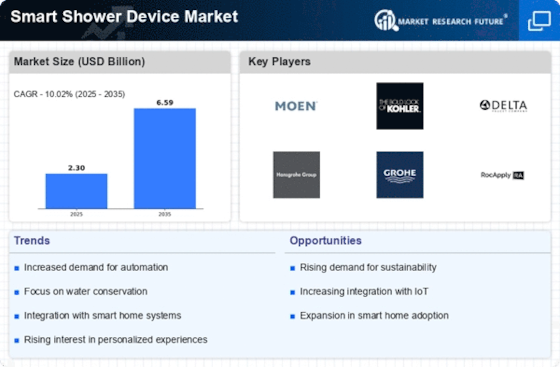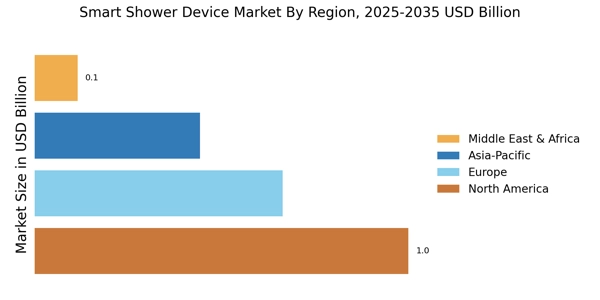Increased Urbanization
Urbanization is a key driver of the Smart Shower Device Market, as more people move to cities and seek modern living solutions. Urban dwellers often prioritize convenience and efficiency, making smart shower devices an attractive option. These devices not only offer advanced features but also help optimize water and energy usage in smaller living spaces. Data indicates that urban populations are projected to increase by 2 billion by 2050, creating a substantial market for smart home technologies. This demographic shift is likely to enhance the growth prospects of the Smart Shower Device Market.
Rising Disposable Incomes
The Smart Shower Device Market is benefiting from rising disposable incomes across various demographics. As consumers have more financial flexibility, they are increasingly willing to invest in premium home improvement products, including smart shower devices. This trend is particularly evident in urban areas, where modern living spaces often incorporate advanced technologies. Market analysis indicates that the luxury home appliance segment is projected to grow by 20% annually, suggesting a robust market for smart shower devices. This increase in disposable income is likely to enhance the appeal of the Smart Shower Device Market.
Health and Wellness Trends
The growing focus on health and wellness is shaping the Smart Shower Device Market. Consumers are increasingly seeking products that promote relaxation and well-being, and smart shower devices are well-positioned to meet this demand. Features such as temperature control, aromatherapy integration, and water filtration systems contribute to a spa-like experience at home. Market Research Future indicates that wellness-related home products are expected to see a growth rate of 15% over the next few years. This trend suggests that the Smart Shower Device Market could capitalize on the intersection of technology and personal health.
Technological Advancements
The Smart Shower Device Market is experiencing rapid technological advancements that enhance user experience and functionality. Innovations such as IoT connectivity, voice control, and mobile app integration are becoming standard features. These advancements allow users to customize their shower settings, monitor water usage, and even receive alerts for maintenance needs. According to recent data, the adoption of smart home technologies is projected to grow at a compound annual growth rate of 25% over the next five years. This trend indicates a strong consumer preference for integrated solutions, thereby driving demand in the Smart Shower Device Market.
Water Conservation Initiatives
Increasing awareness of water conservation is significantly influencing the Smart Shower Device Market. Governments and environmental organizations are promoting initiatives aimed at reducing water consumption, which aligns with the functionalities of smart shower devices. These devices often feature water-saving modes and real-time usage tracking, appealing to eco-conscious consumers. Market data suggests that the demand for water-efficient products is expected to rise by 30% in the coming years, as consumers seek to lower their environmental impact. This growing emphasis on sustainability is likely to propel the Smart Shower Device Market forward.

















